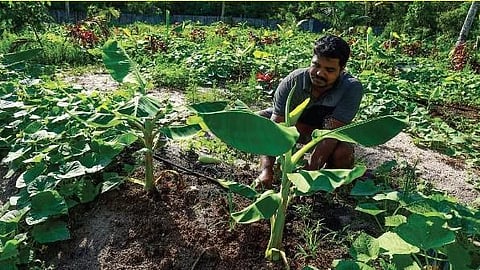

ALAPPUZHA: The Israel trip organised by the state agriculture department to help select farmers get an understanding of the agricultural practices in the Middle Eastern country is bearing fruit, quite literally.
Kanjikuzhy native S P Sujith, who was part of the 27-member delegation of farmers that journeyed to Israel in March to learn the sand-filled country’s peculiar farming practices, has become the first person in the state to set up a banana farm based on the Israel model of farming in the sandy soil of Alappuzha.
He is cultivating the bananas on 1.2 acres of land in Cherthala South panchayat, by fusing the best agricultural practices of Kerala and Israel. The banana seeds were sown 45 days ago and the fruit will be ready for harvesting in 10 months, Sujith said.
Talking about the main agricultural technique from Israel that he incorporated into his farming, Sujith said, “In Kerala, farmers plant bananas in single pits. In Israel, they do three saplings per pit, which is what I have done. I sowed around 1,100 banana seeds, a mix of robusta, eathan, njalipoovan and red poovan varieties. As mid-crop, I planted cucumber for additional revenue. Their harvesting began after 45 days."
He said In Israel, the robusta banana variety is cultivated on a large scale which is then exported.
“It is shorter than other banana varieties and hence, can withstand wind better. However, there is more demand for poovan and eathan in Kerala. So, I cultivated different varieties to ensure a stable market for all. Also, most Israeli farmer follow polyhouse farming to reduce the impact of heat on the crops. They cover the entire plantation with plastic nets to ensure heat and wind do not affect the crops. We too have done this and additionally used arecanut plants to give support to the banana trees,” Sujith said.
Sujith said he used banana seeds purchased from the Vegetables and Fruit Promotion Council and private farmers from Alappuzha. Each seed is priced between Rs 20 and Rs 30.
“A drip irrigation facility was arranged in the plantation, which ensures that extremely less amount of water is required for watering the plants,” Sujith said.
“I spent around Rs 1.5 lakh as initial expenditure to cultivate the land. Around Rs 50,000 more will be needed as labour and manure charges in the coming months. I expect to get back the initial expenditure through the sale of the cucumbers,” Sujith said.
He said the 27-member group is also imparting training to interested farmers. “The government took us to Israel to learn about their precision-farming techniques and popularise it here,” he said.